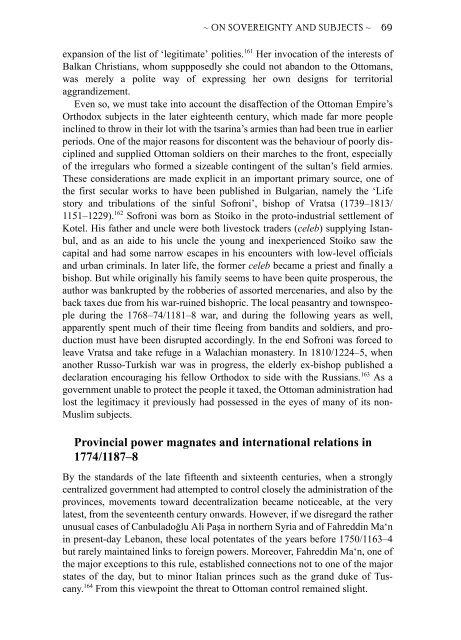The Ottoman Empire and the World Around It - Course Information
The Ottoman Empire and the World Around It - Course Information
The Ottoman Empire and the World Around It - Course Information
You also want an ePaper? Increase the reach of your titles
YUMPU automatically turns print PDFs into web optimized ePapers that Google loves.
~ ON SOVEREIGNTY AND SUBJECTS ~ 69<br />
expansion of <strong>the</strong> list of ‘legitimate’ polities. 161 Her invocation of <strong>the</strong> interests of<br />
Balkan Christians, whom suppposedly she could not ab<strong>and</strong>on to <strong>the</strong> <strong>Ottoman</strong>s,<br />
was merely a polite way of expressing her own designs for territorial<br />
aggr<strong>and</strong>izement.<br />
Even so, we must take into account <strong>the</strong> disaffection of <strong>the</strong> <strong>Ottoman</strong> <strong>Empire</strong>’s<br />
Orthodox subjects in <strong>the</strong> later eighteenth century, which made far more people<br />
inclined to throw in <strong>the</strong>ir lot with <strong>the</strong> tsarina’s armies than had been true in earlier<br />
periods. One of <strong>the</strong> major reasons for discontent was <strong>the</strong> behaviour of poorly disciplined<br />
<strong>and</strong> supplied <strong>Ottoman</strong> soldiers on <strong>the</strong>ir marches to <strong>the</strong> front, especially<br />
of <strong>the</strong> irregulars who formed a sizeable contingent of <strong>the</strong> sultan’s field armies.<br />
<strong>The</strong>se considerations are made explicit in an important primary source, one of<br />
<strong>the</strong> first secular works to have been published in Bulgarian, namely <strong>the</strong> ‘Life<br />
story <strong>and</strong> tribulations of <strong>the</strong> sinful Sofroni’, bishop of Vratsa (1739–1813/<br />
1151–1229). 162 Sofroni was born as Stoiko in <strong>the</strong> proto-industrial settlement of<br />
Kotel. His fa<strong>the</strong>r <strong>and</strong> uncle were both livestock traders (celeb) supplying Istanbul,<br />
<strong>and</strong> as an aide to his uncle <strong>the</strong> young <strong>and</strong> inexperienced Stoiko saw <strong>the</strong><br />
capital <strong>and</strong> had some narrow escapes in his encounters with low-level officials<br />
<strong>and</strong> urban criminals. In later life, <strong>the</strong> former celeb became a priest <strong>and</strong> finally a<br />
bishop. But while originally his family seems to have been quite prosperous, <strong>the</strong><br />
author was bankrupted by <strong>the</strong> robberies of assorted mercenaries, <strong>and</strong> also by <strong>the</strong><br />
back taxes due from his war-ruined bishopric. <strong>The</strong> local peasantry <strong>and</strong> townspeople<br />
during <strong>the</strong> 1768–74/1181–8 war, <strong>and</strong> during <strong>the</strong> following years as well,<br />
apparently spent much of <strong>the</strong>ir time fleeing from b<strong>and</strong>its <strong>and</strong> soldiers, <strong>and</strong> production<br />
must have been disrupted accordingly. In <strong>the</strong> end Sofroni was forced to<br />
leave Vratsa <strong>and</strong> take refuge in a Walachian monastery. In 1810/1224–5, when<br />
ano<strong>the</strong>r Russo-Turkish war was in progress, <strong>the</strong> elderly ex-bishop published a<br />
declaration encouraging his fellow Orthodox to side with <strong>the</strong> Russians. 163 As a<br />
government unable to protect <strong>the</strong> people it taxed, <strong>the</strong> <strong>Ottoman</strong> administration had<br />
lost <strong>the</strong> legitimacy it previously had possessed in <strong>the</strong> eyes of many of its non-<br />
Muslim subjects.<br />
Provincial power magnates <strong>and</strong> international relations in<br />
1774/1187–8<br />
By <strong>the</strong> st<strong>and</strong>ards of <strong>the</strong> late fifteenth <strong>and</strong> sixteenth centuries, when a strongly<br />
centralized government had attempted to control closely <strong>the</strong> administration of <strong>the</strong><br />
provinces, movements toward decentralization became noticeable, at <strong>the</strong> very<br />
latest, from <strong>the</strong> seventeenth century onwards. However, if we disregard <strong>the</strong> ra<strong>the</strong>r<br />
unusual cases of Canbuladoğlu Ali Paşa in nor<strong>the</strong>rn Syria <strong>and</strong> of Fahreddin Ma‘n<br />
in present-day Lebanon, <strong>the</strong>se local potentates of <strong>the</strong> years before 1750/1163–4<br />
but rarely maintained links to foreign powers. Moreover, Fahreddin Ma‘n, one of<br />
<strong>the</strong> major exceptions to this rule, established connections not to one of <strong>the</strong> major<br />
states of <strong>the</strong> day, but to minor <strong>It</strong>alian princes such as <strong>the</strong> gr<strong>and</strong> duke of Tuscany.<br />
164 From this viewpoint <strong>the</strong> threat to <strong>Ottoman</strong> control remained slight.


